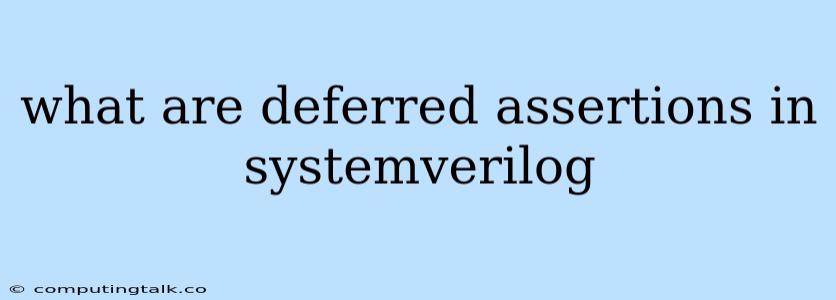What are Deferred Assertions in SystemVerilog?
In the world of hardware verification, ensuring the correctness of your designs is paramount. SystemVerilog, a powerful hardware description and verification language, provides various mechanisms to perform this crucial task. One such mechanism is deferred assertions, a powerful feature that allows you to verify your design's behavior with greater flexibility and control.
But what exactly are deferred assertions, and how do they differ from regular assertions?
Deferred assertions are a type of assertion that can be evaluated at a later point in time, instead of being checked immediately like regular assertions. This delay in evaluation gives you more control over when the assertion is checked, enabling you to verify complex behaviors that might not be readily apparent in the immediate execution cycle.
Why Use Deferred Assertions?
-
Flexibility in Timing: Sometimes, you want to verify a condition based on the outcome of multiple events or actions that might not occur in the same clock cycle. Deferred assertions allow you to delay the assertion evaluation, giving you the time to gather the necessary information for a comprehensive check.
-
Verification of Complex Scenarios: Deferred assertions excel in verifying complex scenarios involving state machines, data dependencies, or scenarios spanning multiple clock cycles. You can use them to check for correct sequence transitions, data integrity after operations, or the successful completion of specific tasks.
-
Enhanced Debugging: Debugging complex failures in hardware designs can be challenging. Deferred assertions help you pinpoint the exact location of the issue by allowing you to examine the state of the design at various stages leading up to the failure.
How Deferred Assertions Work:
Deferred assertions rely on the concept of assertion events. When a deferred assertion is encountered, instead of being evaluated immediately, it is stored in a queue along with an associated event. When the specific event occurs, the associated deferred assertion is triggered and evaluated.
Let's break this down with a simple example:
// Define an event for when a specific value is received
event receive_data;
// Create a deferred assertion that is triggered on receive_data
deferred assert property (data_valid && data_correct)
else $error("Data error detected");
// The assertion checks for data validity and correctness when the event is triggered
In this example, the deferred assertion checks for the validity and correctness of data after the receive_data event has been triggered. The assertion is not evaluated until the event occurs.
Types of Deferred Assertions:
There are two primary types of deferred assertions:
-
Event-based Deferred Assertions: As we saw in the previous example, these assertions are triggered by specific events defined within your code. You can create events based on specific conditions, signals changing, or even timed events.
-
Time-based Deferred Assertions: These assertions are triggered based on a specific time delay. You can specify the amount of time to wait before evaluating the assertion.
Example: Checking for Data Integrity
Let's imagine you're designing a memory controller and want to ensure that data written to the memory is correctly read back. You can use deferred assertions to verify this.
// Define events for write and read operations
event write_complete;
event read_complete;
// Define a deferred assertion to check data integrity
deferred assert property (write_data == read_data)
else $error("Data mismatch detected");
// The assertion checks if the written and read data match after both write and read operations complete
In this example, the deferred assertion is triggered only after both the write and read operations are complete. The assertion checks if the written data matches the read data, highlighting any inconsistencies.
Conclusion:
Deferred assertions are a valuable tool in the arsenal of SystemVerilog verification engineers. They offer the flexibility to evaluate assertions based on specific events or time delays, enabling the verification of complex behavior and more effective debugging of design failures. By strategically employing deferred assertions, you can create robust and comprehensive verification environments, ensuring the correctness and reliability of your hardware designs.
